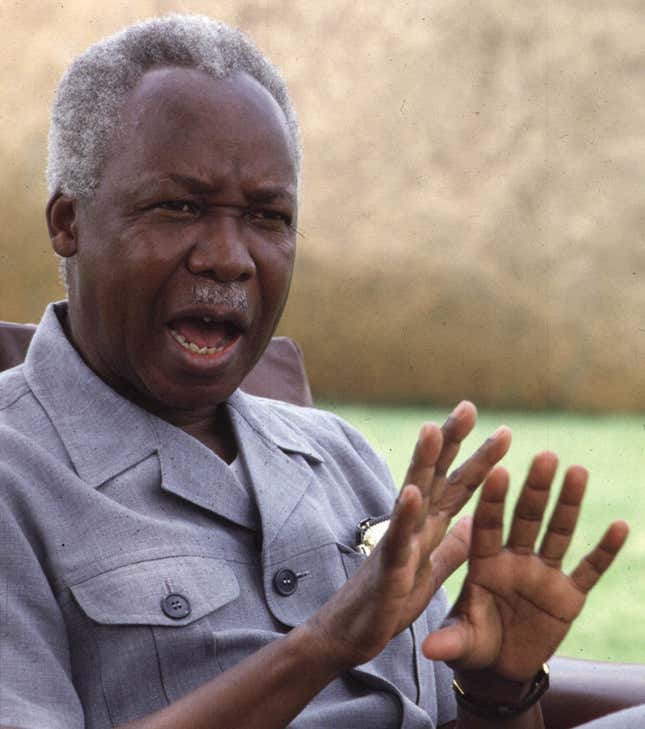Tanzanian president John Pombe Magufuli has canceled this year’s Union Day celebrations, celebrated every April 26. Instead he has recommended road construction with the funds that were set aside for the celebrations.
This follows a similar move last year when he ordered that the December independence day celebrations be dedicated to clean-up campaigns.
The cancelation of two national holidays as cost-cutting measures is Magufuli’s rushed attempt to finally deliver on president Julius Nyerere’s vision of self-reliance, accountability and good governance for his country. Nyerere, Tanzania’s founding father upon its independence in 1961, governed until he retired in 1985.
But to achieve any of these goals, the new president must find consensus for constitutional reforms. This is especially important because the country’s elections have become increasingly competitive. Contested elections in the future could become increasingly polarized. As it is, Magufuli’s rival for the presidency, Edward Lowassa, has refused to recognize last year’s election results.
The reforms should entail a total overhaul of Tanzania’s old constitution. Successive governments since president Nyerere have promised to do this but all have fallen short of their promises. The latest attempt—a referendum on a new constitution planned for last year—also failed. The proposed new constitution was in any event rejected by opposition parties and civil society on the grounds that it was not inclusive enough.

Constitutional reforms would solve the controversy over the mainland’s relationship with the semi-autonomous Zanzibar archipelago. They would also promote the drive for good governance and accountability that Magufuli is championing. He is likely to succeed with these reforms if he undertakes them now while he is still popular among Tanzanians.
Nyerere’s legacy of social cohesion
Nyerere’s main gift to Tanzanians was his ability to nurture a strong form of social cohesion among his countrymen. This seems to have endured. He managed to achieve this through African socialism known as Ujamaa.
Ujamaa was both a party ideology and government policy. Through his pragmatic approach to national unity, Nyerere was able to create a strong sense of social cohesion among Tanzanians, while uniting Zanzibar and Tanganyika.

This social cohesiveness prevailed before and after the recent elections, even though they were the most competitive since independence. Despite the fact that they were heavily polarized and threatened to split the independence party Chama Cha Mapinduzi, Tanzanian leaders made persistent calls for calm. As a result, the country returned to normality after the polls.
This is in sharp contrast with several other countries in the region, specifically in the East African Community. The rest of the community’s members—Burundi, Kenya, Rwanda, South Sudan and Uganda—have all experienced ethnic violence.
Nevertheless trends in Tanzania’s election suggested an emerging ethnic cleavage in the country’s voting patterns. Parties were forced to mobilize support from their leaders’ regional strongholds. This is largely due to political opposition parties gaining increasing clout over the advantages of incumbency enjoyed by Chama Cha Mapinduzi since independence.
Chama Cha Mapinduzi has been the dominant unifying party among top Tanzanian political elites for a long time. But the party nearly split after presidential candidate Edward Lowassa decided to join opposition party Chadema when he failed to clinch the presidential ticket.
The palpable tensions during the campaign resulted in the two leading presidential contenders—Lowassa and Magufuli—whipping up support among their regional bases. Chama Cha Mapinduzi had the advantage of strong grassroots support across the geographically vast country. As a result Magufuli won, clinching more than 58% of the votes. It was the lowest margin in Chama Cha Mapinduzi’s winning streak since independence.
Zanzibar may be the greatest threat
The other issue that greatly threatens Tanzania’s social unity is political instability in Zanzibar. The island experienced political tension during the electioneering period. An archipelago off the Indian Ocean, Zanzibar formed a union with Tanzania in 1964, and has never hidden its desire to secede.
Tensions have been a constant feature on the island since 1995’s multi-party elections. Post-election violence in 2000 triggered the worst political crisis in Zanzibar’s history.
Tensions last year resulted in the elections being nullified. This was not a surprise. The situation was saved by both sides agreeing with the Zanzibar Election Commission’s pledge to conduct a rerun of the elections.
Despite Chama Cha Mapinduzi candidate Ali Mohamed Shein winning the presidency in Zanzibar with 91% of votes cast, the tension is likely to persist. The best option would be to form a government of national unity. The long-term goal should be to agree on constitutional reforms to reduce a sense of marginalization by sections of Zanzibaris.
Economic growth and development pressure
Nyerere is widely credited with unifying Tanzania. But his economic policies, aimed at self-reliance, undermined Tanzania’s economic growth and development.
Nyerere’s policies failed despite Tanzania’s vast deposits of natural resources. The nationalization of businesses and industries drove away foreign direct investment. Kenya, which traditionally has run an open economy, was the main beneficiary.
Now, as Tanzania celebrates its 52nd Union Day, there is a rush to undo past failures. Good governance and accountability are high on Magufuli’s agenda. His style of leadership has included impromptu visits to public offices to see how government officials work.
This has endeared him to Tanzanians and his popularity has soared. Increasingly Tanzanians are coming around to trusting his leadership. But the country needs to establish new state institutions and strengthen existing ones. These are preconditions to the country’s much-needed constitutional reforms.
Good neighborliness
Magufuli would also help Tanzania overcome its economic challenges by forging stronger regional relations. Since independence Tanzania has had varied levels of engagement with countries in the East African Community. The previous Jakaya Kikwete regime had a lukewarm approach towards the regional economic block. The current regime seems to be on a mission to mend fences and position Tanzania as a key actor in regional affairs. This was evident in his recent charm offensive towards Uganda and Rwanda’s leaders. Nevertheless, Tanzania still needs to formulate a grounded foreign policy framework for regional relations.
Sekou Toure Otondi, PhD Candidate, Institute of Diplomacy and International Studies, University of Nairobi.
This article was originally published on The Conversation. Read the original article.




